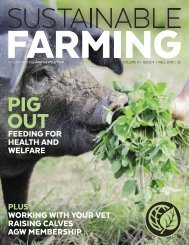A Greener World's Sustainable Farming Magazine — Spring 2024 — V9 I1
News: Filthy Rich – A wealth of nutrients beneath your feet; Regenerative viticulture; Hosting on-farm events; New AGW label rules Cover feature: Start With The Soil Opinion: Regenerative Is For Everyone Technical: A New Vintage Technical: Get On My Land! Certification News: Labeled For Success Meet the Farmer: Message In A BOTL (BOTL Farm in Ashford, CT)
News: Filthy Rich – A wealth of nutrients beneath your feet; Regenerative viticulture; Hosting on-farm events; New AGW label rules
Cover feature: Start With The Soil
Opinion: Regenerative Is For Everyone
Technical: A New Vintage
Technical: Get On My Land!
Certification News: Labeled For Success
Meet the Farmer: Message In A BOTL (BOTL Farm in Ashford, CT)
Create successful ePaper yourself
Turn your PDF publications into a flip-book with our unique Google optimized e-Paper software.
Advertise here<br />
and reach over<br />
15,000<br />
farm, ranch and<br />
food businesses<br />
email advertise@agreenerworld.org<br />
call 800-373-8806<br />
Your donation creates an environmental legacy<br />
A <strong>Greener</strong> World is a nonprofit whose work is made possible by donations from people like you. Because we are not<br />
dependent on certification fees, we can remain impartial in our auditing, resulting in unrivaled integrity and trust.<br />
Your donations help us stay independent. Will you partner with us to build a greener world by giving today?<br />
Find out more at agreenerworld.org/donate<br />
To keep up to date with our latest educational<br />
blog posts and get the latest news delivered<br />
direct to your inbox, simply scan this QR code<br />
or visit<br />
agreenerworld.org/get-involved/email-sign-up<br />
Opinion<br />
REGENERATIVE<br />
IS FOR EVERYONE<br />
Organic<br />
certification<br />
should<br />
not be a<br />
prerequisite,<br />
says Emily<br />
Moose<br />
Emily Moose is AGW’s<br />
Executive Director<br />
Ever since “regenerative agriculture” emerged as<br />
a concept, a debate has raged over exactly what<br />
it means.<br />
Perhaps the most inflammatory question<br />
is whether regenerative agriculture should first<br />
be certified organic. It’s a worthy discussion,<br />
particularly as the labeling landscape becomes<br />
increasingly crowded and farmer bandwidth to<br />
maintain certifications is finite.<br />
To be clear, I believe in the spirit of the organic<br />
principles. Many of our AWA standards have roots<br />
in EU organic standards and I have great respect<br />
for organic farmers. That said, as an organization<br />
dedicated to meeting farmers where they are,<br />
we have always argued that organic certification<br />
shouldn’t be a pre-requisite for regenerative agriculture.<br />
Indeed, the opportunity cost of limiting<br />
regenerative certification to (already) certified<br />
organic farms is more than we (in the broadest<br />
sense) can collectively afford.<br />
Certified organic land represents less than<br />
1% of U.S. farmland; just over 2% in Canada; and<br />
just over 9% in the EU. In total, just 1.6% of global<br />
farmland is certified organic. With the overwhelming<br />
environmental and social challenges facing us, why<br />
should our focus be so narrow? What if we could<br />
reduce agrochemical use, increase soil cover and<br />
biodiversity, lower tillage and emissions, and<br />
improve worker and animal welfare on the<br />
other 98.4%?<br />
While people often assume organic principles<br />
are ‘regenerative’, the organic standards do not<br />
require the benchmarking of things like soil health,<br />
water or air quality, or wildlife species/habitats,<br />
social fairness, nor measurement over time to<br />
ascertain improvements (or otherwise).<br />
Certified Regenerative by AGW addresses<br />
all of these metrics<strong>—</strong>and more. And a farm can<br />
apply both organic and regenerative approaches<br />
simultaneously and maintain both certifications.<br />
Certified Regenerative by AGW complements<strong>—</strong><br />
and arguably enhances<strong>—</strong>organic certification and<br />
we certify many farms that hold both.<br />
There are numerous differences and overlaps<br />
between Certified Regenerative by AGW and<br />
organic certification, but the key difference is that<br />
Certified Regenerative is outcome-based, focused<br />
on regeneration and measured improvements of<br />
ecosystem. Organic certification is input-based,<br />
focused on the use of non-synthetic materials<br />
and prohibiting artificial pesticides and fertilizers.<br />
In our experience, farmers reject organic<br />
certification for a variety of (understandable)<br />
reasons, including the inability to source affordable<br />
organic feed, disagreement with the prohibition on<br />
therapeutic antibiotic use, lack of market demand,<br />
or incompatibility with existing conservation plans.<br />
Many are excited to find an alternative, practical<br />
certification that still provides meaningful<br />
assurances on the things their customers care<br />
about: no GMOs, responsible antibiotic use,<br />
emissions reductions, improved ecosystem<br />
health, and benefits for people and animals.<br />
Fairly or not, organic agriculture has long had<br />
a reputation of being exclusive and has suffered<br />
from perceptions about its attitude toward farmers<br />
who aren’t certified. Yes, ‘Big Ag’ has certainly<br />
stoked this perception, but it’s not entirely<br />
unfounded. At AGW, we approach certification<br />
as a partnership. While we loudly criticize agribusiness<br />
corporations, we never demonize<br />
individual farmers.<br />
The practices many now call ‘regenerative’<br />
predate organic, resting on a foundation of<br />
thousands of years of indigenous agricultural<br />
traditions to which we owe our very existence.<br />
While no certification can fully encapsulate this<br />
intimate connection to agriculture, we believe<br />
Certified Regenerative by AGW is a meaningful,<br />
practical and achievable program that brings<br />
transparency to food production and the<br />
opportunity to create positive change at scale.<br />
6 • SUSTAINABLE FARMING • SPRING <strong>2024</strong><br />
SPRING <strong>2024</strong> • SUSTAINABLE FARMING • 7


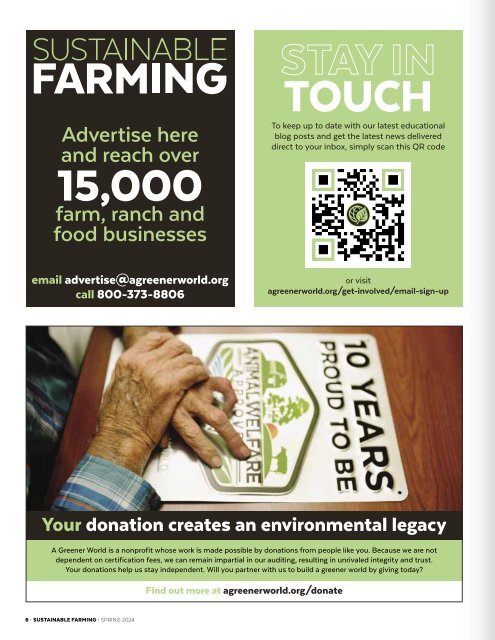

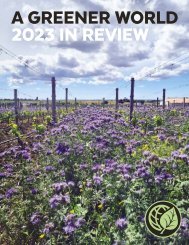
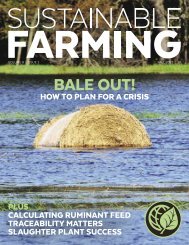
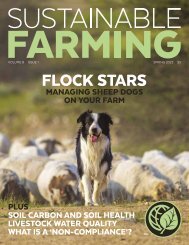
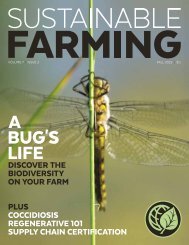
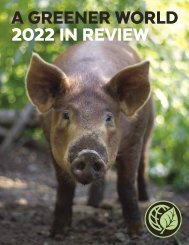
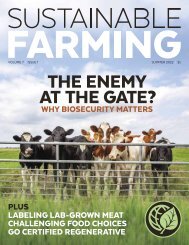
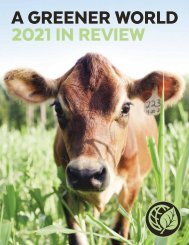
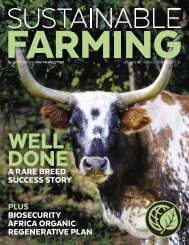




![SF Magazine V5 I1 -- Winter-Spring 2020 [SCREEN ONLY]](https://img.yumpu.com/63122871/1/190x245/sf-magazine-v5-i1-winter-spring-2020-screen-only.jpg?quality=85)
